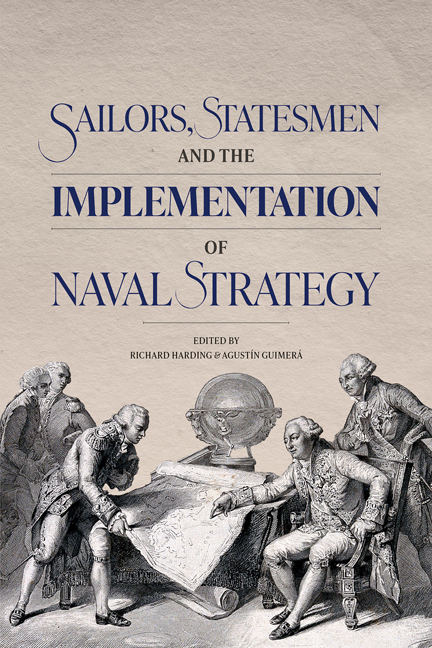Book contents
- Frontmatter
- Dedication
- Contents
- List of Contributors
- Introduction: Naval Leadership: Expertise and Strategy
- 1 The Evolution of French Naval Leadership: Defining the Admiralty of France from the Sixteenth to the Eighteenth Century
- 2 The Makers of Spanish Naval Strategy in the Eighteenth Century: Strategy, Tactics, and Shipbuilding Policy
- 3 Naval Strategic Leadership in Britain, 1739–1748: Political Leaders and Professional Knowledge
- 4 The Statesman and the Naval Leader: The Count of Floridablanca and Navy Minister Antonio Valdés, 1783–1792
- 5 Defining French Eighteenth-Century Naval Strategy
- 6 Casto Méndez Núñez: The Admiral who could have been Regent, 1861–1868
- 7 Teaching by Example: Julian Corbett’s The Campaign of Trafalgar of 1910
- 8 Spanish Naval Leadership during the Second Republic: José Giral Pereira
- 9 The Quest to Understand Naval Leadership: Educating Admirals for High Command in the U.S. Navy from the Eighteenth Century into the Twenty-first Century
- 10 Reflections
- Bibliography
- Index
4 - The Statesman and the Naval Leader: The Count of Floridablanca and Navy Minister Antonio Valdés, 1783–1792
Published online by Cambridge University Press: 08 May 2024
- Frontmatter
- Dedication
- Contents
- List of Contributors
- Introduction: Naval Leadership: Expertise and Strategy
- 1 The Evolution of French Naval Leadership: Defining the Admiralty of France from the Sixteenth to the Eighteenth Century
- 2 The Makers of Spanish Naval Strategy in the Eighteenth Century: Strategy, Tactics, and Shipbuilding Policy
- 3 Naval Strategic Leadership in Britain, 1739–1748: Political Leaders and Professional Knowledge
- 4 The Statesman and the Naval Leader: The Count of Floridablanca and Navy Minister Antonio Valdés, 1783–1792
- 5 Defining French Eighteenth-Century Naval Strategy
- 6 Casto Méndez Núñez: The Admiral who could have been Regent, 1861–1868
- 7 Teaching by Example: Julian Corbett’s The Campaign of Trafalgar of 1910
- 8 Spanish Naval Leadership during the Second Republic: José Giral Pereira
- 9 The Quest to Understand Naval Leadership: Educating Admirals for High Command in the U.S. Navy from the Eighteenth Century into the Twenty-first Century
- 10 Reflections
- Bibliography
- Index
Summary
In 1783, after the signing of the Treaty of Versailles, which brought the American Revolution (1776–1783) to an end, the land area of Spain's possessions in the Americas was larger than at any other point in history. Covering more than 16 million square kilometers, the Spanish Empire included a large part of both the North American and the South American continents. It extended all the way from California in the north Pacific, through the powerful viceroyalties of New Spain and Peru, to Tierra del Fuego, and the viceroyalty of Río de la Plata in the south Atlantic, and included the provinces of New Mexico, Texas, Louisiana, and Florida; the viceroyalty of Nueva Granada and several captaincies general; and the large Caribbean islands of Cuba, Puerto Rico, and Santo Domingo, in addition to the archipelago of the Philippines.
However, in spite of all it had achieved, after the war this huge empire was faced with a number of challenges. Historians today point to the end of the reign of Carlos III (1759–1788) as the beginning of a period of crisis for the Spanish monarchy. The Bourbon Reforms, as they are known, were reaching their limits. This was due in part to factors internal to the Spanish monarchy. But there was a later phase characterized by renewed attempts at reform. This is the period between 1783 and 1792, during the tenure of the Count of Floridablanca as secretary of state – the most powerful position in the government – which coincides with the creation of a new political institution: the Junta de Estado (1787–1792), a council of state that functioned as a true cabinet.
In the present chapter, I focus on the aspects of reform that involved the navy. I attempt to analyze the importance of the support given by Floridablanca to the secretary of the navy, Antonio Valdés (1783–1795), a naval commander who played a leading role in the junta.
In a society based on privilege, like Spain's in the eighteenth century, in which there was no separation between the public and private spheres, power networks were vital. This was true for the exercise of political governance as well as naval leadership. It is important to keep in mind that the court in Madrid, as the embodiment of the absolute monarchy, was the epicenter of power relations between the ruling elites in Spain and its overseas empire.
- Type
- Chapter
- Information
- Publisher: Boydell & BrewerPrint publication year: 2024



